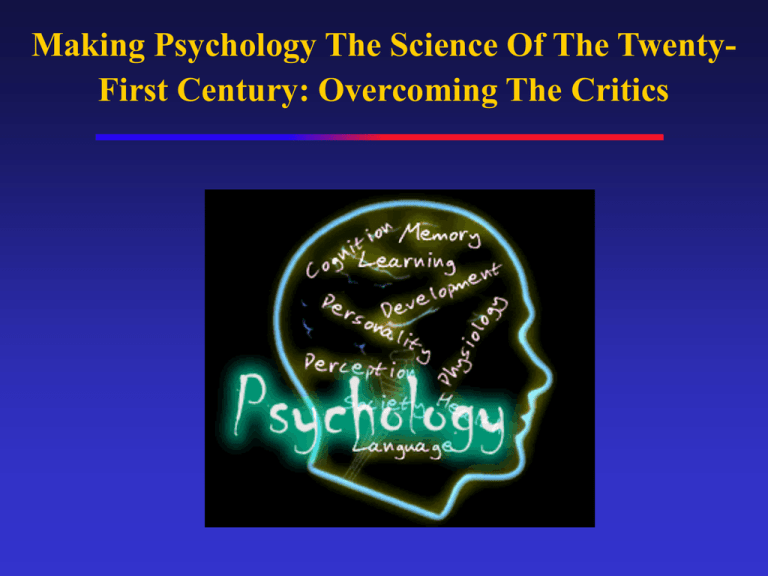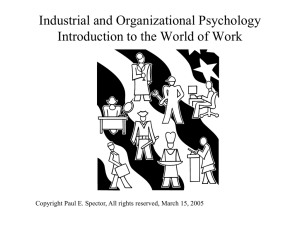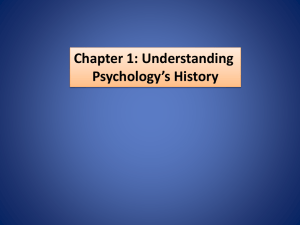
Making Psychology The Science Of The TwentyFirst Century: Overcoming The Critics
Is It Any Wonder That Some People Think We Are All
Bozos On This Psychology Bus
Here Are Some Titles From A British Magazine:
Psychologies
1.
2.
3.
4.
5.
6.
7.
Seize the moment: Get your project off the ground.
Why do I always fall for bad men?
Stop your emotions getting you into trouble.
How to flirt?
How to unlock your creativity.
Why your brain is the sexiest part of your body.
Fix your relationships with Psychologies agony aunt,
Lucy Beresford
8. How much sex is enough?
Skepticism Regarding Psychology: Scott Lilienfeld
“Specifically, most of us will inevitably hear the
assertion from laypersons that psychology—which
those of us within the profession generally regard as
the scientific study of behaviour, broadly construed—
is in actuality not a science. Some outsiders go
further, insinuating or insisting that modern
psychology is pseudoscientific.”
Skepticism Regarding Psychology
“Nevertheless, as a field, we have been reluctant to
examine the reasons for the widespread and
longstanding public criticism of psychology, perhaps
because we see little merit in these reasons. Nor have
we invested much effort in generating potential
solutions for enhancing our field’s public image.”
Why Attend To Lay Perceptions Of Psychology?
1. Persons with mental health issues who could profit from our
services may not seek us out.
2. Public scepticism may indirectly keep psychologists from the
funding lists of some Science, Technology, Engineering, and
Mathematics (STEM) initiatives.
3. Politicians, some who control purse strings, often attack the
work of psychologists because they do not have the background
to understand the objectives of psychological science.
4. The prestige that our profession is held affects our salaries.
5. Students interested in science may not consider psychology as
a profession.
6. If the general public is unaware of the capabilities of
psychological science many of the great problems of the planet
will go unresolved.
Common Misperceptions:
Psychology Is Common Sense
Here are some common beliefs:
1. Opposites attract.
2. We only use 10% of our brain at any one time.
3. Familiarity breeds contempt.
4. Expressing pent-up anger reduces anger (66%;
Brown, 1983).
5.Strange behaviors are especially likely during full
moons (65%; G. W. Russell & Dua, 1983).
6. People with schizophrenia have multiple
personalities (77%; Vaughan, 1977).
Common Misperceptions:
Psychology Is Common Sense
Here are some more common beliefs:
7. Human memory operates like a tape recorder
(27%; Lenz, Ek, & Mills, 2009).
8. The polygraph test is a highly accurate detector of
lies (45%; Taylor & Kowalski, 2004).
9. Hypnotized people act like robots and blindly
follow the suggestions of hypnotists (44%; Green,
Page, Rasekhy, Johnson, & Bernhardt, 2006).
10. On a multiple-choice test, one should stick with
one’s original answer, even if a different answer
seems correct (75%; Kruger, Wirtz, & Miller, 2005).
Common Misperceptions:
Psychology Is Common Sense
How about a few more common beliefs:
11. About 50% believe that schizophrenia is
synonymous with a split personality (H. Stuart &
Arboleda-Florez, 2001; Wahl, 1987);
12. 72% believe that subliminal advertising is
effective in persuading people to purchase products
(Rogers & Smith, 1993)
13. 40% believe that listening to Mozart’s music
enhances intelligence (Chabris & Simons, 2010).
Common Misperceptions:
Psychology Is Common Sense
How about a few more common beliefs:
11. About 50% believe that schizophrenia is
synonymous with a split personality (H. Stuart &
Arboleda-Florez, 2001; Wahl, 1987);
12. 72% believe that subliminal advertising is
effective in persuading people to purchase products
(Rogers & Smith, 1993)
13. 40% believe that listening to Mozart’s music
enhances intelligence (Chabris & Simons, 2010).
Common Misperceptions:
Psychology Is Common Sense
Psychological research has shown that each of these
statements is false.
Common Misperceptions:
Psychology Is Common Sense
Psychological research has shown that each of these
statements is false.
When presented with this evidence a few people will
cave and admit their error. These open minded
people are to be commended. More likely they will
make a stupid defensive statement such as “well I
think that my opinion is just a valid as scientific
research.” If you hear such nonsense, move in for
the kill.
Suggested Rebuttals To The Notion That
Psychology Is Common Sense
The Sweet Rebuttal: Remind them that psychological
science like other sciences often begin with opinions.
Opinions are a good starting point but a poor ending
point for science. One reason we do research is to
separate opinion from fact. As the surprising results of
these among many other studies show, if being
sensible is being in touch with reality, common sense
may be an overly optimistic phrase.
Suggested Rebuttals To The Notion That
Psychology Is Common Sense
The Nasty Rebuttal: Thrust in the dagger. Remind the
fellow that misconceptions about all sciences abound.
At one time many people believed that the world was
square. Eventually, most people reject prescientific
notions and come to accept that the Earth is more
round than square. Of course, they can personally
believe whatever they want. You support the right of
people to believe that the Earth is square.
Nevertheless, most people find it easier to live in a
world of scientific facts than one governed by his own
idiosyncratic fantasies.
Common Misperceptions:
Psychology Does Not Use Scientific Methods
Hearing that makes me MAD!! Good thing that I am
not the Hulk.
Common Misperceptions:
Psychology Does Not Use Scientific Methods
Here is a more reasoned response.
1. Almost every philosopher of science recognizes that there is no
single scientific method. There is diversity across sciences.
2. However, all sciences are marked by a willingness to root out
error in their beliefs.
3. Also, all sciences have procedural safeguards against confirmation
bias-the tendency to seek information consistent with your
hypotheses.
4. A few of these many safeguards used psychologists include:
control groups, double blind studies, randomized assignment to
conditions, statistical controls, and longitudinal designs.
5. You Teacher’s Solution: Essentially, this is an ignorance issue.
Ignorance of science and/or psychology. As always, education is
the remedy for ignorance.
Common Misperceptions:
You Cannot Generalize: Everyone Is Unique
Only a person who has never thought about this
issue would make such a ridiculous comment. Here
are a few polite rejoinders.
1. Obviously every person and event is unique. If,
however, you did not generalize across people and
time you would either be dead or jailed in two hours.
You may never have seen a car that says “Raleigh
Police Department” on the side before but you
would be well served to recognize the special
function of that automobile.
Common Misperceptions:
You Cannot Generalize: Everyone Is Unique
2. Because people are different in some ways does
not mean that they are not alike in the ways that
matter. For instance, one snake phobic be wearing a
red cap and snake phobic a blue cap, but it is still
useful to classify them both as snake phobics if you
plan on treating them.
Common Misperceptions:
Psychology Cannot Make Precise Predictions
A very polite response.
1. Psychology makes probabilistic predictions
because many of the events that we predict are
context dependent. Also, some operative variables
are unknown.
2. Many if not all sciences make probabilistic
predictions and this has nothing to do with their
status as sciences. For instance, meteorologists
estimate the likelihood of where a storm will land
and astronomers estimate the likelihood of a meteor
striking Earth.
Common Misperceptions:
Psychology Is Not Useful
Only a person who knows nothing of psychology
would say that. Consider:
1. Psychologists like Kahneman revolutionized
economics.
2. Psychology has produced major changes in the
legal system. Jury selection, eyewitness
testimony, and false memory studies are just a
few examples. Think of how often forensic
testimony determines court cases.
Common Misperceptions:
Psychology Is Not Useful
3. Operant conditioning has produced extraordinary
changes in education. Two that come quickly to
mind are online or distance education and the
training of severely mentally challenged children.
4. Psychologists determine the appropriate numbers
of individual and the tasks assigned to various
teams. For instance, psychologists determine how to
be assign responsibilities for soldiers flying drones.
Common Misperceptions:
Psychology Is Not Useful
5. Psychologists are involved in worker selection
and evaluation.
6. Psychologists conduct scientific evaluation of
programs to determine which ones are working and
how they may be improved.
7. Applied social psychologists design prisons to
decrease riots and school environments that are more
conductive to learning.
8. The lives of millions of persons have been
bettered because of therapeutic psychological
interventions.
Common Misperceptions:
Psychology Is Not Useful
9. The procedures for polling and marketing research
were developed and often instituted by
psychologists.
10. Psychologists in the most recent campaign.
11. Silver’s predictive model.
12. Your Teacher’s Solution: This, too, is an
ignorance issue. We must simply do a better job
educating the public, pointing out the many
contributions of psychologists to society.
Reason For The Public Skepticism Towards
Psychology: Questionable Clinical Practices
1. One-third of autistic children receive scientifically
unsupported interventions such as sensory-motor integration
therapy and facilitated communication.
2. Interventions without scientific credibility including
acupuncture, herbal therapy, and yoga are often used to treat
clinical depression.
3. About one-fourth of clinical psychologists use suggestive
techniques such as cueing and hypnosis to “recover” past
abuse even though these procedures often generate false
memories.
Reason For The Public Skepticism Towards
Psychology: Questionable Clinical Practices
4. 90% of psychologists treating PTSD do not use any of the
evidence based practices recommended by the government.
5. Only 5% of the 3500 self-help books published each year
are subject to scientific testing.
6. Some prominent persons have resisted the movement to
establish criteria for evidence supported therapy (ESTs).
a. “Psychologists do not have to apologize for their
treatments. Nor is there any actual need to prove their
effectiveness”-Ronald Fox former APA President.
b. Ronald Levant argued that clinical experience and
intuition should be accorded equal status with the best
scientific evidence.
Reason For The Public Skepticism Towards
Psychology: Questionable Clinical Practices
7. Your Teacher’s Solution: Although I am not a clinician,
psychology will not become a well-respected science until
we make clear that when clinicians employ unverified
therapies they are not acting as psychologists. This is the
same path medicine walked in the last half of the nineteenth
century. Only when your therapeutic interventions have a
scientific basis can you claim to be functioning as a
psychologist, regardless of your degree. That being said, the
debate of defining what is an EST is a positive aspect of the
field.
Reason For The Public Skepticism Towards
Psychology: The Public Face Of Psychology
Most people do not see psychology as represented by
scientific researchers or scientifically oriented
psychotherapists. Instead, when they think of psychology
they see the discipline as exemplified by entertainers like
Dr. Phil and Dr. Laura.
1. Why do they present themselves as psychologists and/or
therapists? The answer is simple. They seek to enhance
their credibility by cloaking themselves in the mantle of
science.
2. This problem of confusing entertainers with persons of
expertise is not restricted to psychology. Consider Jon
Stewart and Russ Limbaugh.
Reason For The Public Skepticism Towards
Psychology: The Public Face Of Psychology
3. Both Dr. Phil and Dr. Laura routinely provide unqualified
psychological advice on the basis of minimal clinical
information, a very questionable practice.
4. Here are a few of Dr. Phil’s questionable contentions.
a. The polygraph is a “foolproof” method for determining
if an individual is a sexual predator.
b. EEG biofeedback was recommended as a treatment for
ADHD even though there is no evidence that this
intervention is superior to a placebo.
c. Nevertheless, the APA presented Dr. Phil with a citation
reading, “your work has touched more Americans than
any other living psychologist.”
Reason For The Public Skepticism Towards
Psychology: The Public Face Of Psychology
5. Prior to 1930 many prominent psychologists wrote for a
general audience. These included Watson, James, Thorndike,
Calkins, and Munsterburg. Since that time few successful
psychologists have taken up the pen to explain our discipline
to the public.
6. Instead, we have left the field to unscientific popular
magazines such as Psychology Today and Psychologies.
There are notable exceptions such as Skinner and Kahneman
have published scientifically credible books intended for the
general public.
Reason For The Public Skepticism Towards
Psychology: The Public Face Of Psychology
7. Your Teacher’s Solution: Make clear that entertainers like
Dr. Phil and Dr. Laura are not employing approved
psychological practices and distance ourselves from them.
Also, provide academics credit for publications intended for
the general public.
Reason For The Public Skepticism Towards Psychology:
Psychologist-Psychotherapist Confusion
1. Most people erroneous believe most psychologists are
therapists.
2. Psychologists are seen as soft-minded and focused on
abnormality. Scientists are seen as tough-minded and
focused on normality.
3. Your Teacher’s Solution: APA and APS are trying to
educate the public regarding the roles that psychologists
play. This is a positive step but will it be enough?
Reason For The Public Skepticism Towards
Psychology: Hindsight Bias
The hindsight bias is the tendency to perceive outcomes as
foreseeable once we know them. To a large extent this
occurs because we can almost always create a plausible
explanation after the fact.
1. Baratz (1983) provides a cool example. To illustrate,
some students read that “Single women express more
concern over their unmarried state than single men” and
others read that “Single men express more concern over
their unmarried state than single women.” Both groups
indicated that they would have predicted this finding.
Reason For The Public Skepticism Towards
Psychology: Hindsight Bias
2. Because of the hindsight bias most people will
overestimate the likelihood that they would in advance have
predicted a particular outcome be it the results of an
election, the outcome of a psychological investigation, etc.
3. Your Teacher’s Solution: This is a hard one as humans are
rarely aware of their own biases. My solution may not be
successful but the best that I can do is to suggest that you
point out the hindsight bias and make the person aware that
other predictions were possible and perhaps equally likely.








